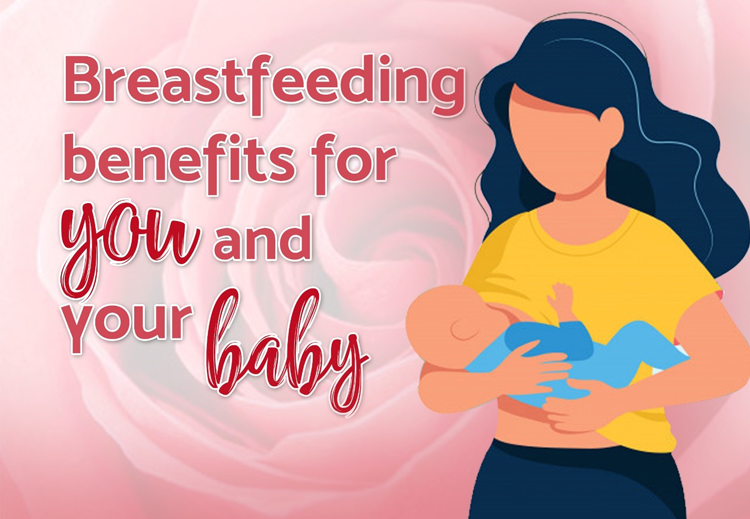Breastfeeding benefits you and your baby!
Exclusively feeding your baby with breastmilk is incredibly beneficial. It serves the right nutrients and protection your child needs for the first six (6) months. It is not only beneficial for your baby, but also for you.
Benefits for Baby
- Offers complete nutrition for the first 6 months
- For the first few days, the mother releases colostrum which is packed with protein and low in sugar and loaded with helpful compounds. It also adjusts its composition according to the needs of your baby.
- Nutrients found in breastmilk can be easily absorbed by the baby.
- The only lacking vitamin in breastmilk is Vitamin D. Vitamin D drops can aid this deficiency and is recommended for babies 2-4 weeks old.
- Provides protection from viruses and bacteria
- Colostrum gives high amounts of immunoglobulin A and other antibodies. It also provides a layer of protection in the nose, throat and digestive system of the baby.
- When the mother develops antibodies during exposure to viruses or bacteria, these antibodies are passed to the baby through breastmilk.
- Reduces risk of developing diseases, infection and allergy
- May reduce the risk of developing:
- Allergies
- Eczema
- Asthma
- Leukemia
- Lymphoma
- Diabetes
- Crohn’s Disease
- Colitis
- Respiratory Diseases
- Speech and Orthodontic problems
- Cavities
- Ear Infections
- Gut infections
- Intestinal Tissue Damage
- Inflammatory Bowel Disease
- Sudden Infant Death Syndrome
- Lowers the risk of obesity
- Breastmilk provides beneficial gut bacteria and leptin which regulates fat storage.
- Babies who are breastfed develop healthy eating patterns.
- May affect development of the brain and minimizes the risk of developing behavior and learning problems
- Physical bond between the mother and the child may be a factor.
- Breastfeeding may contribute to the child’s high intelligence scores.
Benefits for Mommy
- May aid in weight loss after the first 3 months of breastfeeding
- The first 3 months may result in weight gain due to an increase in appetite to suffice 500-calorie demands of milk production. Weight loss usually kicks in after the first 3 months because of increased fat burning.
- Diet and exercise still play a big role in weight loss.
- Helps in reducing blood loss after delivery and helps the uterus in returning to its normal size
- Oxytocin is a hormone that increases throughout pregnancy and during breastfeeding. This hormone helps the uterus in returning to its normal size and minimizes bleeding.
- Lessens the risk of developing post-partum depression
- Breastfeeding releases certain hormones which encourages maternal caregiving and bonding.
- Increased amount of oxytocin and prolactin promotes nurturing and relaxation.
- A feeling of calmness is promoted because breastfed children cry less and are less likely to develop illnesses.
- One year of breastfeeding may lower the risk of developing several diseases such as:
- Breast cancer
- Ovarian cancer
- Rheumatoid arthritis
- Endometriosis
- Osteoporosis
- Diabetes
- Hypertension
- Cardiovascular disease
- Can pause ovulation and menstruation which helps in birth spacing
- When done regularly, breastfeeding pauses ovulation and menstruation which in turn minimizes total potential fertility.
- Birth spacing allows the mother to recuperate from pregnancy.
References:
- Healthline
- Cleveland Clinic
- Ten Steps to Successful Breastfeeding
———————————————————————————————————————————————————-
Disclaimer:
All content found on the DLSUMC website, including text, graphics, images, audio or other formats were created for general informational purposes only and are not intended or implied to be substitutes for professional medical advice, diagnosis or treatment.
If you think you may have a medical emergency, call your doctor, go to the emergency department, or call your local emergency hotline immediately.

